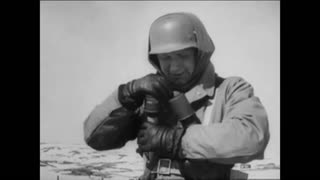Premium Only Content

1st Mountain Division - Edelweiss - 1. Geb. - Brandenburger - Nachtigall - Lviv - Lemberg - OUN-R
SUPPORT THE CHANNEL
www.Patreon.com/Military1945
Today we’re embedded with the 1. Gebirgsjäger Division, or 1st Mountain Division known as Edelweiss, as they make slow but steady progress into the Ukraine. We’ll stay with the unit as it follows up the Ukrainian Brandenburger’s operation to take and secure the city of Lviv. The history of that special forces unit is both interesting, controversial and even relevant today.
If you’re interested in seeing associated footage that can’t be shown on YouTube go to our website at Military1945.com. Eventually there will be a full video-on-demand channel there.
The 1. Mountain Division was part of the 49th Mountain Corps which included the 257 ID, the 100. Light Division and the 4. Mountain division which had taken up a defensive position at Lancut the headquarters of Army Group South.
Across from the 1. Mountain was the Soviet 97th Rifle Division that was considered well armed but less well equipped with transport.
Within minutes of crossing the frontier the first reports came in stating that all units were advancing as planned and that as of yet only individual shots could be heard. The enemy was taken completely by surprise. But that first day was not destined to end easily. This is from the memoirs of a soldier that fought with the 1st Mountain Division written after the war:
The enemy has been taken by surprise however they quickly managed to regroup and put up bitter resistance. The fighting intensity and losses taken by both sides put to pale our combat experiences in Poland, France and Yugoslavia. Already in this first encounter it clear that we were engaged in a fight to the death.
On June 24th this is what was written in the German High Command War Diary for Army Group South.
The enemy is putting up stiff resistance and often fighting to the death. Therefor there is a limited number of prisoners taken but they are suffering bloody losses. Our tank forces, after engaging in heavy combat, are victorious everywhere. Likewise our infantry’s anti-tank defenses have been active and successful. The Luftwaffe generally controls the skies.
The limited progress for these first days in comparison to that of Army Group Center had much to do with the fact that Army Group South only had 5 panzer divisions at its disposal. Army Group Center had 9 panzer divisions which gave it much more offensive punching power. While the Soviets were being overrun to the north, in the south they had more opportunity to fight back.
In spite of the difficulties steady progress towards Lviv was being made. And the soldiers of the 1st surely must have had a sense of deja vu. In September of 1939 the same division had advanced over the same territory but at that time they were fighting the Poles.
Here we see a unit of signal corps soldiers crossing and laying communication lines across an anti tank trench. This would be about all the climbing these mountain troops would be doing for quite some time; to be specific until August of 1942 when they’d be asked to climb the Elbrus.
In the Winter of 1940/41, after Hitler had come to the final decision to attack the Soviet Union, the Ukrainian Brandenburger Battalions Nachtigall and Roland were established and trained by the Wehrmacht. They received German uniforms however were only outfitted with light infantry weapons.
The Nachtigall battalion was attached to the First Mountain Division which was commanded by Lt. General Karl Lanz. At 3.15 hours the unit crossed the San river and entered the Soviet side of the city Przemysl. Over the next few days they advanced slowly towards Lviv. As they approached the city the Ukrainians were responsible for clearing civilians out of the way of the general advance and providing cover for the 1. Mountain Division.
On the night of June 29 the Brandenburger battalions advanced against relatively weak soviet resistance to a few km east of the Lviv airport. Throughout the day reports had been coming in from spies that had already infiltrated the city that the Soviets had begun mass executions of nationalist Ukrainians that here being held in their prisons. Soviet forces were also supposedly already evacuating the city.
Lt. General Lanz, concerned that the Soviets were laying an ambush, rejected the suggestion that the city should be taken immediately, and ordered the Ukrainian Brandenburger units to stand down. That night further reports came in telling of new rounds of mass executions and the anxiety among the Ukrainian soldiers had reached a breaking point. Ukrainian representatives within the units went against direct orders and unilaterally ordered the Brandenburgers to prepare to enter the city immediately.
Later that afternoon the Germans finally entered the city they were treated as liberators by the population. Lt. General Lanz would receive an accommodation for supposedly taking the city which of course is not what had happened at all.
-
 8:37
8:37
Military1945
27 days agoVolunteer Norwegian Legion - Narvik - Lebensborn - Finnish Winter War - Josef Terboven - Waffen SS
1051 -
 1:56:07
1:56:07
Matt Kohrs
12 hours agoStocks Fall, Breaking Market News & Live Trading $1M || The MK Show
72.9K3 -
 LIVE
LIVE
The Big Mig™
4 hours agoIt’s Time To Pay The Piper Letitia James!
4,694 watching -
 33:37
33:37
Stephen Gardner
15 hours ago🔥Trump's LATEST legal NIGHTMARE explained by Alan Dershowitz!
30.9K52 -
 LIVE
LIVE
Badlands Media
8 hours agoBadlands Daily: April 16, 2025
5,141 watching -
 58:41
58:41
Randi Hipper
2 hours agoCRYPTO WINTER IS BACK? BITCOIN MAJOR LEVEL TO WATCH
34.5K -
 LIVE
LIVE
Wendy Bell Radio
7 hours agoDemocrats Are Making The Icing For Their Midterm Slaughter Cake
8,443 watching -
 1:06:43
1:06:43
Dear America
14 hours agoJoe Biden Emerges From Hibernation + Trump Fires 20,000 IRS Agents, Letitia James Get Karma?!
57.7K34 -
 1:26:12
1:26:12
JULIE GREEN MINISTRIES
5 hours agoLIVE WITH JULIE
182K199 -

Major League Fishing
2 days agoLIVE Tackle Warehouse Invitationals, Stop 3, Day 2
29.8K